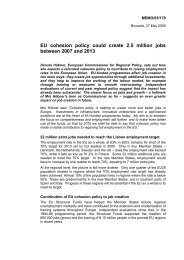Industrial Relations in Europe 2012 - European Commission - Europa
Industrial Relations in Europe 2012 - European Commission - Europa
Industrial Relations in Europe 2012 - European Commission - Europa
Create successful ePaper yourself
Turn your PDF publications into a flip-book with our unique Google optimized e-Paper software.
with adequate services as well as the crucial role of workers <strong>in</strong> achiev<strong>in</strong>g these goals. The response<br />
of this sectoral social dialogue committee to the <strong>Europe</strong>an <strong>Commission</strong>’s Green Paper on<br />
Restructur<strong>in</strong>g and anticipation of change: what lessons from recent experiences? underl<strong>in</strong>es how<br />
the f<strong>in</strong>ancial crisis has, on one side, “highlighted the important role central government<br />
adm<strong>in</strong>istrations play <strong>in</strong> regulat<strong>in</strong>g the market, provid<strong>in</strong>g employment and social protection and<br />
jobs” and on the other hand has led to “programmes of pay, pensions and job cuts or freezes,<br />
reforms of work<strong>in</strong>g conditions as well as changes of labour law”. The social partners <strong>in</strong> this sector<br />
also state that “a major feature of restructur<strong>in</strong>g <strong>in</strong> the public sector is that the social dialogue has<br />
been sidel<strong>in</strong>ed”, although there are cases where social dialogue has contributed to settl<strong>in</strong>g disputes<br />
and overcom<strong>in</strong>g tensions – for example <strong>in</strong> Ireland, Lithuania and Slovenia – thereby show<strong>in</strong>g “that<br />
it is possible for social dialogue to deliver results <strong>in</strong> tense national contexts”. In Slovenia, there are<br />
ris<strong>in</strong>g tensions <strong>in</strong> the area of social dialogue – for example, no new social agreement has yet been<br />
adopted s<strong>in</strong>ce the expiry of the previous one <strong>in</strong> 2009, due to the differ<strong>in</strong>g expectations of the social<br />
partners. Further, there is cont<strong>in</strong>u<strong>in</strong>g opposition from public sector unions to government plans for<br />
additional public sector pay cuts.<br />
As can be seen, the economic crisis has been addressed <strong>in</strong> some of the sectoral social dialogue<br />
committees <strong>in</strong> the public sector by means of jo<strong>in</strong>t statements. These documents have reviewed the<br />
impact of the economic downturn on the relevant sectors, notably central and local adm<strong>in</strong>istrations,<br />
and stressed the importance of support<strong>in</strong>g public service provision through adequate fund<strong>in</strong>g and<br />
staff<strong>in</strong>g, <strong>in</strong> terms of both employment and skill levels, and promot<strong>in</strong>g social dialogue to accompany<br />
reform and restructur<strong>in</strong>g. In this sense, although they have contributed to the debate, they have not<br />
directly affected policy implementation.<br />
3.6 Wage sett<strong>in</strong>g systems<br />
In connection with the above-mentioned specific regulation of the employment relationship <strong>in</strong> the<br />
public sector, which persists <strong>in</strong> many EU countries, three formally different wage sett<strong>in</strong>g systems<br />
can be found <strong>in</strong> the public sector: a) unilateral determ<strong>in</strong>ation on the part of the government or public<br />
authorities, through laws or adm<strong>in</strong>istrative acts; b) free collective barga<strong>in</strong><strong>in</strong>g, along the l<strong>in</strong>es of<br />
wage sett<strong>in</strong>g <strong>in</strong> the private sector; c) mixed or hybrid arrangements, that are neither unilateral<br />
determ<strong>in</strong>ation nor collective barga<strong>in</strong><strong>in</strong>g. The latter mechanism refers ma<strong>in</strong>ly to the UK experience<br />
of the pay review bodies, which must be considered as a special case as they cannot be equated with<br />
either of the above systems of pay determ<strong>in</strong>ation, although they share some elements of both.<br />
A further issue arises when the outcomes of negotiations need a decision of the government to be<br />
implemented. One possibility is that this decision is just a procedural formality that can be taken for<br />
granted, <strong>in</strong> which case this system can be classed as de facto collective barga<strong>in</strong><strong>in</strong>g (the Italian<br />
experience between 1983 and 1993, for <strong>in</strong>stance, or Cyprus). A different possibility is when the<br />
outcomes of negotiations are never b<strong>in</strong>d<strong>in</strong>g for the government and can be substantially amended or<br />
totally disregarded, as <strong>in</strong> France, <strong>in</strong> which case the system is closer to unilateral regulation than to<br />
collective barga<strong>in</strong><strong>in</strong>g.<br />
In general terms, free collective barga<strong>in</strong><strong>in</strong>g prevails <strong>in</strong> the UK (except for the groups of employees<br />
under the pay review body system) all the Nordic countries, Ireland, Netherlands, Belgium, Italy,<br />
Spa<strong>in</strong>, and, with qualifications, Cyprus, Malta, Luxembourg, Greece and Portugal. In Portugal the<br />
government has the power to decide unilaterally <strong>in</strong> the case of a stalemate <strong>in</strong> negotiations. In Greece<br />
also, civil servants under public law have been permitted s<strong>in</strong>ce 1999 to negotiate their terms and<br />
conditions of employment (tra<strong>in</strong><strong>in</strong>g, health and safety, mobility, trade union prerogatives), but pay<br />
issues are excluded, while public sector employees under private contracts enjoy full barga<strong>in</strong><strong>in</strong>g<br />
rights <strong>in</strong> l<strong>in</strong>e with rights enjoyed by private sector employees (Ioannou 1999; <strong>2012</strong>). In<br />
Luxembourg wage agreements must be confirmed by law.<br />
140

















